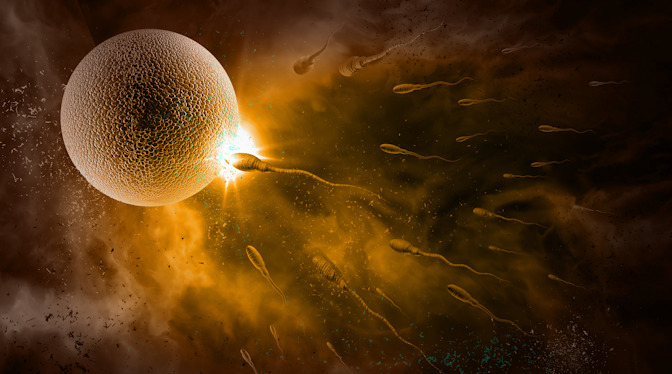In 2011, voters in Mississippi had the opportunity to decide when human life begins.
Not in actuality, or course. When human life begins is a scientific fact. It might be debated by politicians, but it isn't changed by a vote. What they voted on was a legality.
The official ballot summary of the measure read:
"Initiative #26 would amend the Mississippi Constitution to define the word 'person' or 'persons', as those terms are used in Article III of the state constitution, to include every human being from the moment of fertilization, cloning, or the functional equivalent thereof."
The measure was defeated 57% to 42%.
While the Mississippi Constitution uses the word “person” several times, such as in section 22, “No person shall be deprived of life, liberty, or property except by due process of law,” it had never defined just exactly who or what a “person” was. Until our confusing times, it had apparently never needed to be defined.
But now, when even words like “man,” “woman,” and “marriage” have become ambiguous, it seems “person” needs a definition.
Somewhat surprisingly given the current climate, at least 38 states already have “fetal homicide” laws; that is, laws which penalize an act of violence which causes physical harm to an unborn child. Mississippi, for example, already had laws on the books that defined manslaughter as including “the willful killing of an unborn quick child by an injury to the mother of such child.” (Miss.Code Ann.§ 97-3-37) They also define murder to include murder that is done “with deliberate design to effect the death of an unborn child.” (§ 97-3-19)
Political groups lined up on both sides of the Mississippi debate but, really, they were just using the publicity to further their own agendas. There are already laws on the books that specifically exclude from prosecution “acts committed by the mother, a medical procedure performed by a medical professional or lawfully prescribed medication.” (§ 11.7.13)
Thus even if the new wording was adopted women would have continued to ask for abortions, and doctors would have continued to perform abortions, without fear of criminal action.
If abortion were entirely about “a woman’s right to choose,” then removing an embryo would be no different from a woman electing to have her gall bladder removed. Yet, if a woman with no pain went to a doctor for such an operation, with few exceptions the doctor would probably try to talk her out of it.
Significantly, the Bible describes an embryo as a person. David wrote of God: “Your eyes saw my embryo; and in your book all my members were written, the days they were formed, and not one was among them.” (Ps. 139:16) Notice he did not say ‘my mother’s embryo.’ That verse also makes it clear that David considered himself to have been a person even before all his ‘members were formed.’
Similarly, the Bible character Job poetically describes a day nine months before his birth when his mother may have exclaimed, `A man-child hath been conceived.' (Job 3:3) Job did not consider his beginning as simply a bit of tissue that his mother had a choice to retain or discard.
Professor Jerome Lejeune, the researcher who discovered the genetic cause of Down Syndrome, testified before the Fifth Judicial District of Tennessee on September 21, 1989, that “as soon as he has been conceived, a man is a man.”
And he wasn’t a lone voice in the wilderness. Here’s what some other scientists have said:
“A zygote is the beginning of a new human being. Human development begins at fertilization.” - The Developing Human: Clinically Oriented Embryology, 6th ed. Keith L. Moore, Ph.D. & T.V.N. Persaud, Md.
"The penetration of the ovum by a spermatozoan and resultant mingling of the nuclear material each brings to the union … marks the initiation of the life of a new individual." - Human Embryology, 3rd ed. Bradley M. Patten
"The zygote thus formed represents the beginning of a new life." - J.P. Greenhill and E.A. Friedman Biological Principles and Modern Practice of Obstetrics
"A new genetically distinct human organism is formed when the chromosomes of the male and female pronuclei blend in the oocyte." - Ronan O'Rahilly and Fabiola Miller, Human Embryology and Teratology
The pro-abortion crowd always brings up very sensitive questions such as:
- What if the mother’s life is in danger?
- What if she was raped?
- What if she is too young or mentally unstable to be a mom?
- How do you weigh the potential benefits of embryonic stem cell research against the lost life of an embryo?
- How do you weigh the emotional needs of the wannabe mom against the lives of the unneeded embryos that end up being discarded after in vitro fertilization?
- What about custody of the frozen embryos in cases of divorce?
In every case, challenging as the question may be, difficult as the answer may be, at its core it is a simple truth: an embryo is a human life.
Regardless of how the good people of Mississippi voted.
Please leave a respectful comment. To read another of my columns on this subject, click here.
Bill K. Underwood is the author of several novels and one non-fiction
self-help book, all available
at Amazon.com.

No comments:
Post a Comment